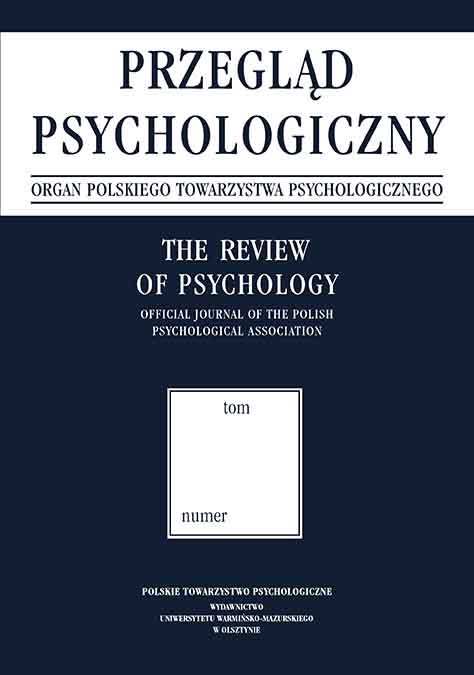Polish version of the TOSCA-3 questionnaire (The Test of Self-Conscious Affect, J. P. Tangney, R. Dearing, P. E. Wagner, & R. Gramzow) – a pilot study
Polish version of the TOSCA-3 questionnaire (The Test of Self-Conscious Affect, J. P. Tangney, R. Dearing, P. E. Wagner, & R. Gramzow) – a pilot study
Author(s): Artur Adamczyk, Adam Michał SobolewskiSubject(s): Clinical psychology
Published by: Wydawnictwo Uniwersytetu Warmińsko-Mazurskiego w Olsztynie
Keywords: shame; guilt; TOSCA-3; adaptation; psychometrics;
Summary/Abstract: Objective The operationalization of the concepts of shame and guilt poses a challenge not only for research participants attempting to analyze these emotions, but also for psychologists themselves. Scenario-based questionnaires offer a solution to this problem. This article describes the process of adapting the TOSCA-3 questionnaire to the Polish language. Method The TOSCA-3 questionnaire was adapted to Polish based on the international recommendations for the cultural adaptation of psychometric questionnaires. A pilot study was conducted using the newly adapted TOSCA-3 questionnaire, the SWLS questionnaire, the MCSDS self-report questionnaire, and the EPQ-R(S) questionnaire. The study was conducted on a random sample of 148 people. Results The obtained results (means, standard deviations, and Cronbach’s α) were satisfactory, which points to the psychometric validity of the adapted questionnaire. The validation process revealed lower life satisfaction among people who are more prone to experience shame (r = ‒.177; p < .05), whereas the scores of subjects who are more prone to experience guilt confirmed a positive correlation with the results obtained on the social approval-seeking scale (MCSDS; r = .38; p < .05). Furthermore, the scores on extraversion and neuroticism scales were correlated with shame proneness (r = ‒.25; p < .05 and r = .40; p < .05, respectively). Conclusions The statistical analysis confirmed that the TOSCA-3 questionnaire was reliably translated and adapted to the Polish language. The results of the pilot study suggest that the adaptation process was successful. The tool can be used in research. However, the collected data do not support analyses of factor relevance or the development of standards for individual diagnoses. The results of the pilot validation study make a valuable contribution to the scientific debate on shame and guilt proneness which are rarely discussed in the Polish literature.
Journal: Przegląd Psychologiczny
- Issue Year: 65/2022
- Issue No: 1
- Page Range: 161-175
- Page Count: 15
- Language: English

